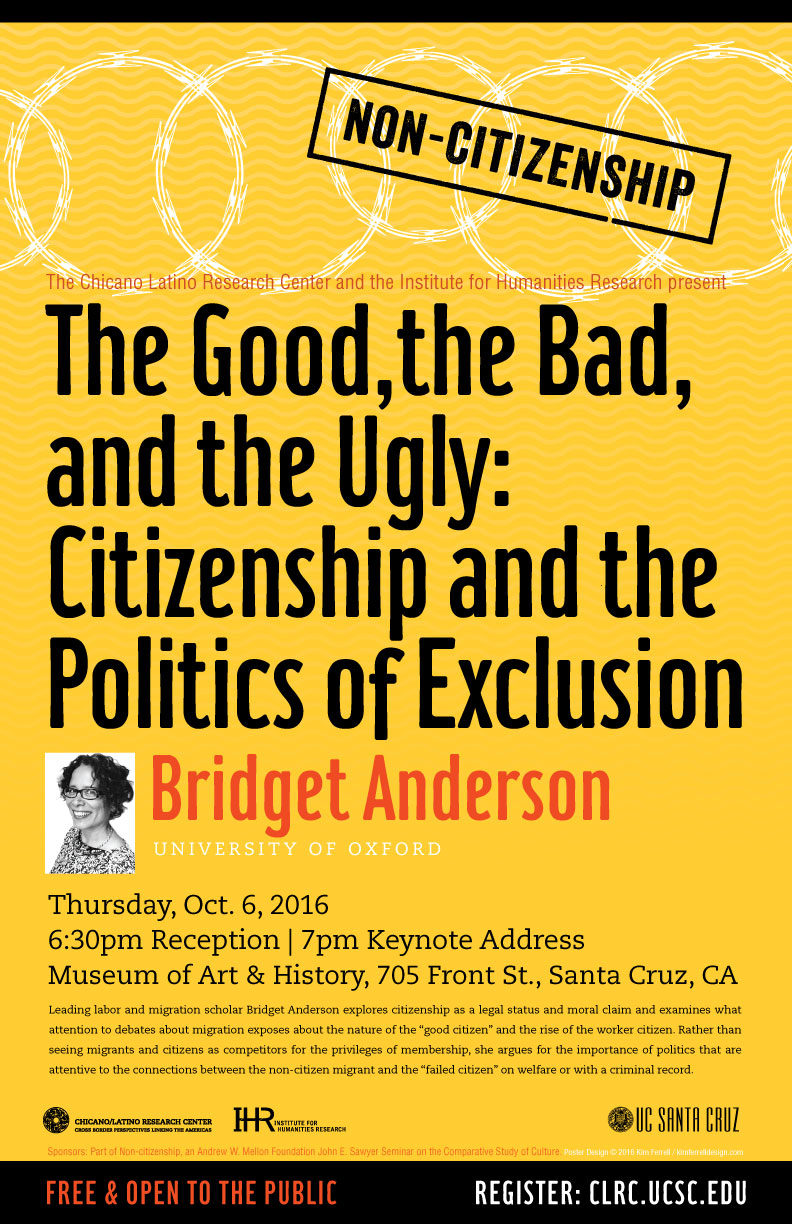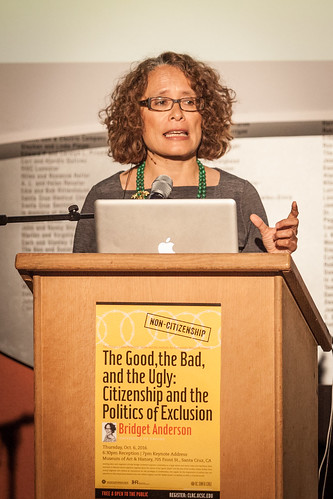Events

- This event has passed.

Bridget Anderson: The Good, the Bad, and the Ugly: Citizenship and the Politics of Exclusion (Non-citizenship series)
October 6, 2016 @ 6:30 pm - 8:00 pm | Santa Cruz Museum of Art and History
FreeThe Chicano Latino Research Center and Institute for Humanities Research present
Leading labor and migration scholar, Bridget Anderson, for the inaugural event in a series of events on Non-citizenship, our 2016-17 Andrew W. Mellon Foundation John E. Sawyer Seminar on the Comparative Study of Culture..
Bridget Anderson: The Good, the Bad, and the Ugly: Citizenship and the Politics of Exclusion (Non-citizenship series) 10.6.16 from IHR on Vimeo
EVENT PHOTOS: by Steve Kurtz
In her keynote address, “The Good, the Bad, and the Ugly: Citizenship and the Politics of Exclusion,” Professor Anderson explores citizenship as both a legal status and moral claim. She examines what attention to debates about migration exposes about the nature of the “good citizen” and the rise of the worker citizen. Rather than seeing migrants and citizens as competitors for the privileges of membership, she argues for the importance of politics that are attentive to the connections between the non-citizen migrant and the “failed citizen” on welfare or with a criminal record. This event is free and open to the public. Refreshments will be served.
Sylvanna Falcón, associate professor of Latin American and Latino Studies at UC Santa Cruz, will facilitate the discussion following Professor Anderson’s remarks.
Photo exhibit Expulsion: Stories of Displacement from Colombia, India, Mexico and the United States, co-curated by Claudia Maria Lopez, Andrew W. Mellon Foundation John E. Sawyer Seminar Graduate Student Fellow.
Bridget Anderson is Professor of Migration and Citizenship and Deputy Director at the Centre on Migration, Policy and Society at the University of Oxford. She is the author of numerous publications, including Us and Them? The Dangerous Politics of Immigration Controls (Oxford University Press, 2013) and Doing the Dirty Work? The Global Politics of Domestic Labour (Zed Books, 2000). Exploring the tension between labor market flexibilities and citizenship rights, she has pioneered an understanding of the functions of immigration in key labor market sectors. Her interest in labor demand has meant an engagement with debates about trafficking, modern day slavery, state enforcement, and deportation. She is particularly concerned with the ways immigration controls increasingly impact citizens and migrants alike.
Location:
Santa Cruz Museum of Art and History (705 Front Street, Santa Cruz)
Event details:
Reception at 6:30pm / Lecture at 7:00pm
Admission:
Free and open to the public, but attendees are asked to register in advance.
Other Events with Bridget Anderson
Friday, September 16, 11:00am-1:00pm, Charles E. Merrill Lounge
Brown bag luncheon and discussion about the introduction to Bridget Anderson’s Us and Them (Oxford University Press, 2013) and Bridget Anderson and Joseph Carens’ “Critical Dialogue” (Perspectives on Politics Vol. 13, No. 3 [2015]). This event is open to UC Santa Cruz faculty, students, and staff. Attendees are free to bring their own lunches and should email Catherine Ramírez (cathysue@ucsc.edu) to RSVP.
Tuesday, October 4, 11:00am-1:00pm, Humanities 1, Room 210
Linking Citizenship, Migration, Labor, Border, and Carceral Studies: A Seminar with Bridget Anderson. This event is open to UC Santa Cruz faculty, students, and staff. REGISTER HERE for the seminar by Tuesday, September 27th.
Wednesday, October 5, 2:00-4:00pm, in Humanities 1, Room 210
Building Bridges and Institutions: A Conversation with Bridget Anderson. This event is open to UC Santa Cruz faculty, students, and staff. REGISTER HERE for the conversation on institution building by Wednesday, September 28th.
About Non-citizenship
Non-citizenship is part of the Andrew W. Mellon Foundation John E. Sawyer Seminar on the Comparative Study of Culture. Linking citizenship, migration, border, labor, and carceral studies, and juxtaposing spatial and social mobility and immobility, this year-long series of events explores what it means to be a citizen and non-citizen in a world made by migrants, refugees, guest workers, permanent residents, asylum seekers, slaves, prisoners, detainees, the stateless, and denizens (residents who do not hold the same rights as citizens). Non-citizenship is organized around three themes: “Forced Migration” (fall 2016), “Labor Mobility and Precarity” (winter 2017), and “Fluidity of Status: Migrants, Citizens, Denizens” (spring 2017). Click here to learn more.

